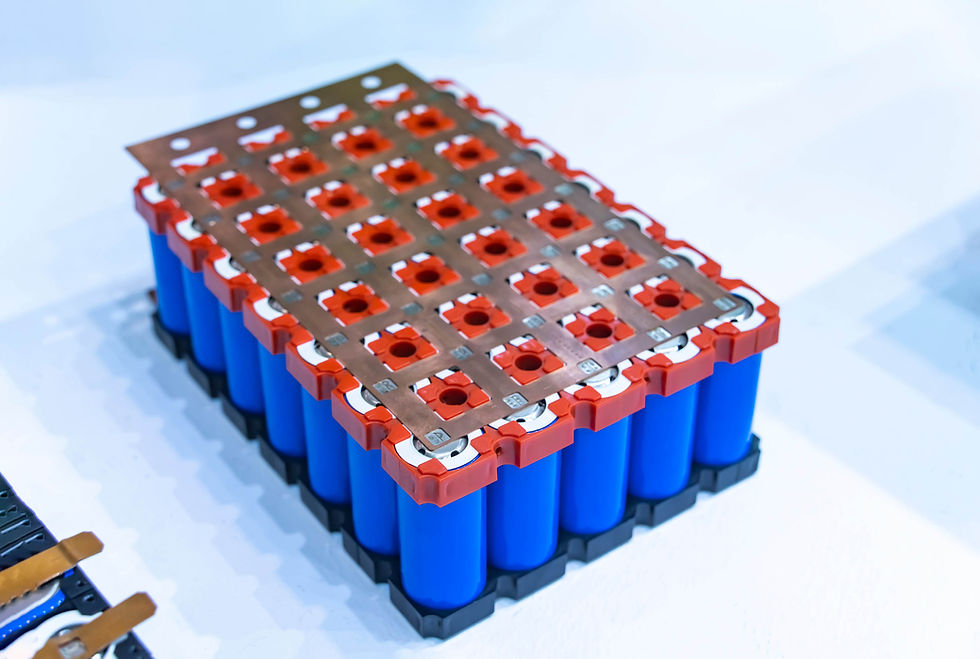
-
数据收集:从客户处收集详细的电池信息
-
确定最佳转售渠道:Bluewater 利用所收集的信息对电池进行评估,以确定最合适的转售渠道
-
各方达成协议: Bluewater、客户以及所有第三方就价格达成一致,并签订合同
-
采购和物流: Bluewater 安排电池的提取,并运输至再制造工厂
-
再制造:将电池整合并重新调配到新电池组的制造中。
Bluewater 的流程
Bluewater 从拥有过剩库存的公司收购电池。如果您因项目取消、生产问题、采购过量或财务困境等原因,有多余的电池,尤其是锂离子电池需要处理掉,可联系 Bluewater 公司。
转售
解决的客户挑战:
-
原始设备制造商(OEM)贸易限制: Bluewater 能够应对原始设备制造商的贸易限制,帮助客户找到符合原始设备制造商协议的替代转售渠道。
-
知识产权保护: Bluewater 在整个转售过程中确保对敏感数据和专有技术进行安全处理。
-
法律/合同障碍: Bluewater 的内部法律顾问提供专业的法律指导,简化复杂的合同要求,并为客户降低法律风险。
-
市场波动:电池市场的波动带来了挑战。Bluewater 提供市场洞察和风险管理策略,帮助客户实现其资产价值的最大化。

重复使用/改型利用
Bluewater 提供了一系列广泛的解决方案,以推动锂离子电池的再利用和功能再造。通常情况下,客户会有一些已退役或因保修而退回的电池。这些电池通常仍具有较高的健康状态(超过 80%)。Bluewater 已经成功地对超过 1.5 GWH 的电池进行了再利用或功能再造。如果您拥有未损坏的废旧电池,并且有兴趣探索除回收之外的其他处理方案,请联系 Bluewater。
Bluewater 的流程
2. 二次利用解决方案:
-
电池评估: Bluewater 团队会与客户合作,收集详细的电池信息,例如电池的化学组成、外形规格、容量、状况、健康状态(SOH)以及使用历史记录等。
A. Reuse in Original Application: Bluewater 公司将对电池进行翻新,使其符合所需的规格要求(例如,更换低容量的电芯 / 模块或其他组件)。该公司将确保电池达到可在其原始应用场景中再次使用的质量标准。
在新应用场景中的改型利用:
-
拆解电池组;
-
测试并评估电池的健康状态;
-
将电池电芯 / 模块整合到新的电池组中;
-
重新部署新的电池组(用于诸如储能或电动出行等应用场景)。
解决的客户挑战:
-
安全包装与运输规程:Bluewater 采用专门的包装和严格的运输规程,在运输过程中保护电池安全,同时遵守所有运输法规。
-
电池集成的一致性:不同类型的电池电芯或模块绝对不会集成到同一个电池组中。
-
再制造电池的联合国标准:在电池功能再造流程完成后,对电池进行严格测试,以确保其符合安全标准和法规要求。
-
知识产权保护: Bluewater 注重保护知识产权,并且能够对敏感的电池组件进行安全处置,以保护专有信息。
-
废旧电池的报废回收:对于不符合功能再造规格的电池单元,Bluewater 确保对未使用的电池进行妥善的回收处理。

-
电池分析: Bluewater 进行初步分析,根据电池的化学性质、状况、格式和位置确定最合适的回收选项。
-
包装 - Bluewater 提供符合所有法规的包装选择。
-
收集和物流 - Bluewater 收集电池并将其从客户所在地运送到回收设施,并生成该过程的详细文档。
-
报废回收 - 请参阅以下锂离子和其他类型电池的回收流程。
Bluewater 的流程
Bluewater 利用其在全球范围内由行业领先的电池回收商组成的网络开展业务。Bluewater 的回收合作伙伴运用先进技术,以优化对制造新电池所需材料的回收。截至目前,Bluewater 已管理回收了超过 400 万磅的电池。如果您拥有达到使用寿命或已损坏的电池,Bluewater 将代您管理回收流程。
回收利用
湿法冶金工艺:
一种涉及使用酸或溶剂等水溶液从电池中提取有价值材料的回收方法。
火法冶金工艺:
利用焚烧或冶炼等高温工艺从电池中回收有价值材料的回收方法。
解决的客户挑战:
-
受损电池 —— 受损电池具有危险性,必须由具备资质的合作伙伴进行妥善处理、搬运、运输和处置。此外,Bluewater 提供符合 PG1 评级的定制包装,这是安全运输待处置的受损电池所必需的。
-
法规合规性:Bluewater 严格遵守所有关于电池包装、运输和回收的法规以及环境标准。
-
销毁证明和审计跟踪报告:应客户要求,Bluewater 会提供销毁证明以及回收过程的详细报告,以证明其符合法规要求和环境标准。
-
保险要求:Bluewater 及其回收合作伙伴遵守必要的保险标准,以保护客户免受潜在的责任风险。
更多服务
Surplus batteries are new, unused battery inventory resulting from project cancellations, manufacturing overruns, facility closures, etc. are typically used in cost-effective energy storage solutions while maintaining original quality standards.
Absolutely. We buy lithium-ion batteries, including lithium-ion batteries from stationary energy storage systems (BESS), electric vehicles (EV), and other stationary and mobility battery applications. Our team will assess your batteries and provide a competitive offer.
Bluewater provides comprehensive surplus battery services including assessment, testing, re-certification (where possible), resale and shipping batteries, ensuring maximum value recovery through proper handling and distribution. Bluewater takes care of the logistics of battery shipping, including packaging, labelling, and documentation and keeps the full paper trail.
Bluewater handles lithium-ion batteries from both mobility applications (electric vehicles, marine batteries) and stationary applications (energy storage systems, industrial UPS).
Surplus battery sellers recover maximum value of their assets and enable second-life battery buyers for BESS, marine applications, and mobile equipment to gain access to cost-effective power solutions.
By repurposing and redistributing battery systems for energy storage and backup power, costs for renewable power solutions can be reduced. EV battery packs are disassembled to the cell level for these battery storage solutions.
Using surplus batteries minimizes waste and CO2 emissions by extending battery life. Using these batteries support circularity and creates a more sustainable energy storage ecosystem.
A second life battery is a used battery, often from EVs or BESS, that is repurposed for a new application after its initial use. These batteries are tested and redeployed for energy storage or other uses, extending their lifecycle.
Old EV batteries are evaluated for reuse, repurposing, or recycling. We maximize value by finding second life applications or recycling them through certified battery recycling companies, supporting the circular battery economy.
Second life batteries are commonly used in stationary energy storage systems (BESS) with renewable energy integration, backup power, and electric mobility applications, such as electric scooters, electric bikes, and others. This supports the circular battery economy and reduces waste.
The lifespan of a second life battery depends on its original use and condition, but typically ranges from 5 to 10 years in new applications. We assess each battery to ensure optimal performance and value in its second life.
The evaluation process typically includes comprehensive testing, capacity verification, safety certification, and performance validation to ensure batteries meet quality standards and perform reliably in their intended applications. Bluewater customers get full access to data on battery origin, technical specifications and history.
We accept broken, damaged, or recalled (DDR) batteries for responsible recycling. Our experts will evaluate the condition and provide the best solution for packaging and shipping your battery to recycle.
Yes, Bluewater Battery acquires surplus, used, and end-of-life batteries, including scrap batteries, from a variety of sources. We provide instant offers and ensure responsible recycling or repurpose through our global network.
Yes, we buy and sell surplus solar batteries, including those from battery energy storage systems (BESS). If you have solar batteries to decommission, contact us.
Key features include collecting battery data, decommissioning planning, discharging, disassembling, packaging, labeling, logistics, recycling, and inventory management. A paper trail for its services, including a Certificate of Destruction (COD), is provided.
The excess and surplus batteries that Bluewater resells meet strict quality standards, including compliance with regulatory requirements for handling and transporting.
The best way to sell excess and surplus batteries is to move them to the next application as fast as possible, given the downward trend in new battery prices and rapidly changing technology. Providing supporting documents and photos, full data transparency will also help getting the best price per battery cell.
The best options include direct resale to qualified buyers, and repurposing for different applications, ideally at the battery pack level. The best option for the batteries that have reached the end of their useful life is recycling through qualified and highly scrutinized channels.
Choose a partner based on their capabilities, industry experience, distribution network, and track record in handling surplus battery inventory, ensuring they can maximize value while maintaining compliance.









